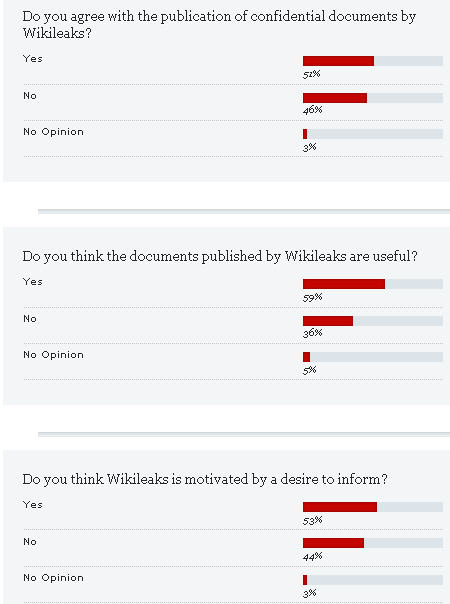ZDNet's Wikileaks poll: You're conflicted

When it comes to Wikileaks you're a conflicted bunch. Simply put, Wikileaks is a topic that doesn't necessarily yield much consensus.
Wikileaks' Julian Assange is either a hero to some or a villain to others. There's not a lot in between. I suppose that's to be expected since Wikileaks is publishing confidential U.S. documents.
Over the last three days, we conducted a global survey on our ZDNet properties. In the U.S. nearly 4,000 folks took the poll. Surveys were launched in Australia, U.K. France, Germany, Japan and broader Asia. We'll wrap up the global view in a future post.
Here's a look at the U.S. results and where you stand. For starters, 51 percent of you agreed with the publication of confidential documents. Forty-six percent of you said Wikileaks shouldn't have published the documents. A few of you had no opinion. These results aren't all that surprising. If you asked me for thoughts on Wikileaks in the morning I'd say the docs should have been published. By the afternoon, I may have changed my mind. We're conflicted.
A wider margin---59 percent of you---thought the Wikileaks documents were useful, but 53 percent said that the organization was motivated by the desire to inform.
In the second block of questions, Wikileaks drew a little more of a consensus. Sixty-two percent of you thought Wikileaks was motivated by politics and 76 percent of you said you understood why some governments didn't want to host the documents. However, 57 percent of you also said some country should host the documents.
The one place where there was a definite majority was the use of denial-of-service attacks as a form of protest. Sixty-five percent of you said that DoS attacks are not a legit form of protests. The ZDNet audience was roughly split on whether Wikileaks forced you to rethink your data security practices. Eighteen percent of you had no opinion.
The write-in question revolved around whether Wikileaks had an effect on the way people and governments approach the Internet and IT.
You can see all of the comments on that topic in Talkback. Here are some of the more notable ones:
The problem is now that Wikileaks has released all the information governments around the world will tighten up and become less open. It will become more and more difficult to get leaked information in the future. In the long term we will learn less.
And.
Please don't take this as an argument against the publishing of "leaked" information. It is important that appropriate information is leaked and published to keep governments honest. The problem I have with Wikileaks is that they published huge amounts of information and than made a big noise about how much more they had. It is almost as though the organization got carried away with its own celebrity. Had that information been leaked quietly to a variety of news sources, in smaller amounts, over a period of time it may not have raised the ire of so many governments.
And.
Wikileaks exposing secrets doesn't serve the need of the people of the U.S., by allowing them to know what's going on, it serves the needs of the enemies of the U.S. Those enemies do not recognize good intentions of ANY U.S. citizen.
And.
The value of the Wikileaks information is fairly useless in most respects, other than to show citizens that the government indeed keeps a lot of secrets from us, and that much of the secrecy is intended to protect officials and bureaucrats, not the true interests of the citizens.
And.
My take? Wikileaks is no different from a free and vigorous press. Necessary to insure freedom but sometimes painful in it's process. I support a free and vigorous press and personal free speech.
And.
Governments and military do not know how to protect shared knowledge, but believe that they do because of what they spend to protect it, under advice from the IT industry. Wikileaks is teaching them otherwise. It is just a wake-up call.
